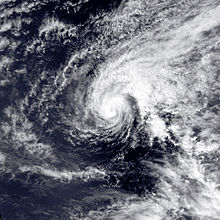 Ekeka near peak intensity on February 2 | |
| Meteorological history | |
|---|---|
| Formed | January 28, 1992 |
| Dissipated | February 8, 1992 |
| Category 3 major hurricane | |
| 1-minute sustained (SSHWS/NWS) | |
| Highest winds | 115 mph (185 km/h) |
| Lowest pressure | 985 mbar (hPa); 29.09 inHg |
| Overall effects | |
| Fatalities | None |
| Damage | Minimal |
| Areas affected | Marshall Islands, Chuuk, Palmyra Atoll |
| IBTrACS | |
Part of the 1992 Pacific hurricane and typhoon seasons | |
Hurricane Ekeka was the most intense off-season tropical cyclone on record in the northeastern Pacific basin. The first storm of the 1992 Pacific hurricane season, Ekeka developed on January 28 well to the south of Hawaii. It gradually intensified to reach major hurricane status on February 2, although it subsequently began to weaken due to unfavorable high wind shear. It crossed the International Date Line as a weakened tropical storm, and shortly thereafter degraded to tropical depression status. Ekeka continued westward, passing through the Marshall Islands and later over Chuuk State, before dissipating on February 9 about 310 miles (500 km) off the north coast of Papua New Guinea. The storm did not cause any significant damage or deaths.